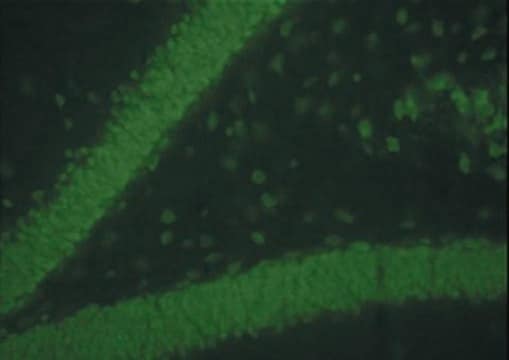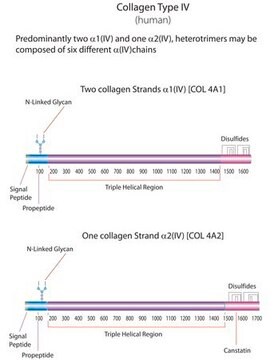MAB1430
Anti-Collagen Type IV Antibody, clone 24.12.8 (PHM-12)
clone 24.12.8 (PHM-12), Chemicon®, from mouse
Iniciar sesiónpara Ver la Fijación de precios por contrato y de la organización
About This Item
UNSPSC Code:
12352203
eCl@ss:
32160702
NACRES:
NA.41
Productos recomendados
biological source
mouse
Quality Level
antibody form
purified immunoglobulin
clone
24.12.8 (PHM-12), monoclonal
species reactivity
human
manufacturer/tradename
Chemicon®
technique(s)
immunohistochemistry (formalin-fixed, paraffin-embedded sections): suitable
isotype
IgG1
UniProt accession no.
shipped in
wet ice
target post-translational modification
unmodified
General description
BIOCHEMISTRY:
p I = 5.5
p I = 5.5
Specificity
MAB1430 provides a marker for an antigen known to be important in glomerular cell-matrix interactions, and should prove useful in research into the mechanisms involved in renal pathology. This antibody reacts with glomerular and tubular basement membranes in kidney as well as basal lamina of capillaries. It also labels mesangial cells and matrix within the glomerulus as well as basement membrane structures in all organs examined (Gusterson et al., 1984).
Immunogen
Human glomeruli
Application
Detect Collagen Type IV using this Anti-Collagen Type IV Antibody, clone 24.12.8 (PHM-12) validated for use in IH, IH(P).
The antibody is suitable for use on both frozen and protease digested paraffin processed tissue.
SUGGESTED USAGE
Indirect immunoperoxidase staining - the final dilution will depend on the assay conditions and detection system employed. However, a dilution of at least 1:40 will be applicable to most commonly used systems.
Optimal working dilutions must be determined by the end user.
SUGGESTED USAGE
Indirect immunoperoxidase staining - the final dilution will depend on the assay conditions and detection system employed. However, a dilution of at least 1:40 will be applicable to most commonly used systems.
Optimal working dilutions must be determined by the end user.
Physical form
Format: Purified
Purified immunoglobulin presented as a liquid in phosphate buffered saline, pH 7.4, containing 0.2% bovine serum albumin and 0.1% sodium azide.
Storage and Stability
Store at 2 to 8°C, for up to 6 months. For prolonged periods, store below -20°C in undiluted aliquots. AVOID REPEATED FREEZE/THAW CYCLES.
WARNING: The monoclonal reagent solution contains 0.1% sodium azide as a preservative. Due to potential hazards arising from the build up of this material in pipes, spent reagent should be disposed of with liberal volumes of water.
WARNING: The monoclonal reagent solution contains 0.1% sodium azide as a preservative. Due to potential hazards arising from the build up of this material in pipes, spent reagent should be disposed of with liberal volumes of water.
Other Notes
Concentration: Please refer to the Certificate of Analysis for the lot-specific concentration.
Legal Information
CHEMICON is a registered trademark of Merck KGaA, Darmstadt, Germany
Storage Class
12 - Non Combustible Liquids
wgk_germany
WGK 2
flash_point_f
Not applicable
flash_point_c
Not applicable
Certificados de análisis (COA)
Busque Certificados de análisis (COA) introduciendo el número de lote del producto. Los números de lote se encuentran en la etiqueta del producto después de las palabras «Lot» o «Batch»
¿Ya tiene este producto?
Encuentre la documentación para los productos que ha comprado recientemente en la Biblioteca de documentos.
Production of monoclonal antibodies to fibronectin, type IV collagen and other antigens of the human glomerulus.
Hancock, W W, et al.
Pathology, 16, 197-206 (1984)
S E Aggrey et al.
Poultry science, 73(12), 1822-1828 (1994-12-01)
Records of 1,530 Japanese quail were used to estimate heritabilities and genetic correlations based on a derivative-free restricted maximum likelihood (REML) method with an animal model and ANOVA. The animal model included fixed effects of hatch and sex, random effects
Morphofunctional studies of the glomerular wall in mice lacking entactin-1.
Simon-Philippe Lebel, Yong Chen, Diane Gingras, Albert E Chung, Moise Bendayan
The journal of histochemistry and cytochemistry : official journal of the Histochemistry Society null
Invading squamous cell carcinoma can retain a basal lamina. An immunohistochemical study using a monoclonal antibody to type IV collagen.
Gusterson, B A, et al.
Laboratory Investigation; a Journal of Technical Methods and Pathology, 51, 82-87 (1984)
Fibroblasts facilitate re-epithelialization in wounded human skin equivalents.
El Ghalbzouri, Abdoelwaheb, et al.
Laboratory Investigation; a Journal of Technical Methods and Pathology, 84, 102-112 (2004)
Nuestro equipo de científicos tiene experiencia en todas las áreas de investigación: Ciencias de la vida, Ciencia de los materiales, Síntesis química, Cromatografía, Analítica y muchas otras.
Póngase en contacto con el Servicio técnico







